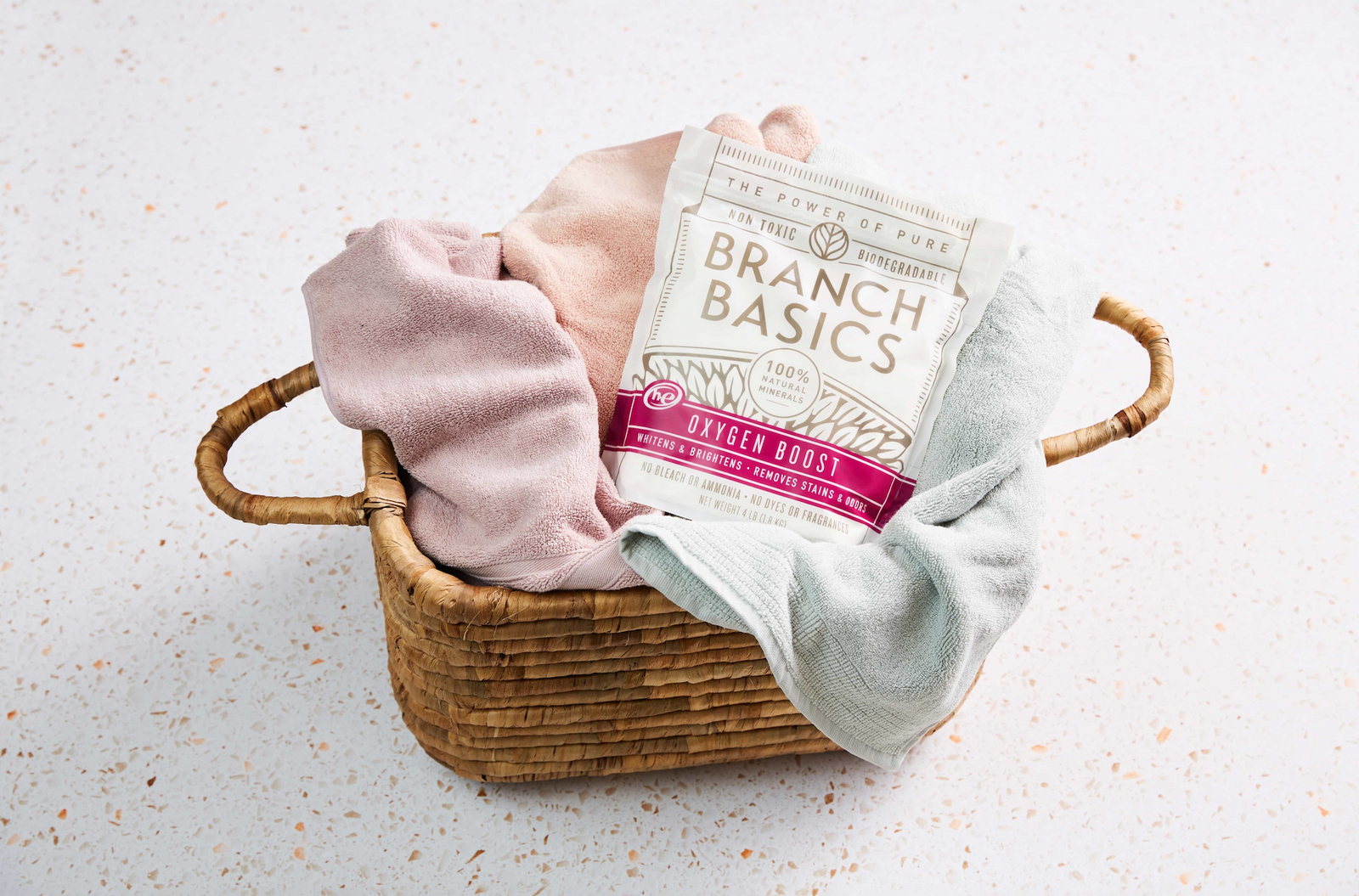The Impact Of Soft And Hard Water On Laundry

Today we’re answering one of the most frequently asked questions we receive: how hard or soft water affects your laundry, specifically how it affects Branch Basics Laundry and Laundry Detergent performance, and how to adjust accordingly.
As we’ve discussed in previous articles and our #Toss The Toxins Online Course, laundry rooms are often one of most toxic rooms in the house.
This is due to the cocktail of synthetic chemicals found in laundry detergents, dryer sheets, stain removers, boosters, bleach, etc., which outgas from bottles even when they’re closed.
Thus, tossing the toxins in your laundry room should be a top priority if improving indoor air quality and overall health is the goal.
This begins with eliminating synthetic chemical-based, fragranced, and even some “green”, “plant-based”, or “natural” laundry products for human-safe options (like Branch Basics Laundry Detergent, Branch Basics Laundry, Oxygen Boost, and Wool Dryer Balls).
However, sometimes the type of water you have in your home can affect how laundry detergents (including ours) perform.
The good news is there are inexpensive and easy human-safe work-arounds to ensure you get bright, clean clothes load after load!
What Is Hard Water Vs. Soft Water?
Local water quality varies by municipality and regions. Some places have hard water, which according to the United States Geological Survey means it’s high in calcium, magnesium and other minerals which are leached from rocks.
Soft water, by comparison, contains low or no amounts of calcium and magnesium.
Hard water isn’t always a problem for laundry. However, if you have very hard water (aka high levels of minerals) it can cause your laundry detergent, shampoo, hand soap and dishwashing detergent to be less effective.
You may notice clothes looking dingy, unclean or that their color is fading quickly.
Other signs of hard water include cloudiness or spots on clean dishes when run through the dishwasher, scale on sinks or tubs, reduced performance of hot water heater, reduced washing machine and dishwasher performance and clogging or corrosion of pipes.
The USGS has a handy map of areas generally affected by high mineral deposits in water here.
How Hard Water Affects Your Laundry… And What To Do About It
Water is a naturally excellent solvent, which is why it picks up minerals along its journey to your municipality or well.
However, when water is rich in minerals it lessens the stain and soil-removal power of most types of detergents and soaps (natural or not).
It can also clog up your pipes and hoses which forces your washer to work harder, leading to damage over time.
Laundry Adjustments For Hard Water
If you know you have very hard water that’s affecting your laundry, the simplest, short-term solution is to use more detergent. In the case of Branch Basics Laundry, you have a few different options:
- Add 1/2 to 1 cup of distilled white vinegar to your washer with every wash
- Add 1/2 to 1 cup of baking soda (to the drum of an HE or top loader) to achieve the same effect.
Tip: we like to buy baking soda in bulk from our local price club.
Note: For best results, baking soda and vinegar should not be used simultaneously in your washing machine. It is best to add vinegar to the rinse cycle, where it can work as a rinse aid to minimize hard water deposits on clothing. Baking soda (sodium bicarbonate) can also help to soften water and deodorize, and is already included in Oxygen Boost - but additional baking soda to increase water softening should best be added at the beginning of the wash cycle.
It’s also a good idea to clean your appliances regularly by running a vinegar and hot water cycle. This will help prevent scale build up and prolong the life of your washer, dishwasher and other small appliances.
Water Filter Fixes For Hard Water
If you want to get rid of your hard water problems for good, your best options are either a whole house water filter that removes these specific minerals or a water softening system.
There are also chemical-based water treatment options that neutralize minerals, which we do not recommend!
The only type of whole house water filter that removes both contaminants and calcium, magnesium and other hard-water causing minerals is a Reverse Osmosis (aka RO) system.
Pros of a RO system: It will filter out nearly all types of contaminants and soften your water simultaneously.
Cons of a RO system: They tend to be expensive and do reject a good amount of water, which can go to waste unless you have a way to collect it and reuse it. Also, since they remove all minerals you may want to consider supplementing with trace minerals (because the right amount of minerals are essential to good health).
A water softener is a type of water filter designed to remove only minerals, not contaminants.
So, if you decide to go with a water softener we’d also highly recommend getting a high-quality water filter to remove harmful contaminants for your drinking water, showers and baths too.
Learn more in How to Choose the Best Water Filter for Every Home and Budget.
For more tips on how to use Branch Basics Laundry, Laundry Detergent, Oxygen Boost, and Wool Dryer Balls, click here to download our User Guide.
Marilee Nelson
Marilee Nelson is an Environmental Toxins expert who has spent nearly 30 years advocating for the chemically-sensitive and chronically-ill. She is a Board Certified Nutritionist, Certified Bau-Biologist and Bau-Biology Inspector and specializes in Food As Medicine. She has helped thousands of families and individuals identify, heal and recover from toxic exposures and is on a mission to revolutionize the way American families view their health.








